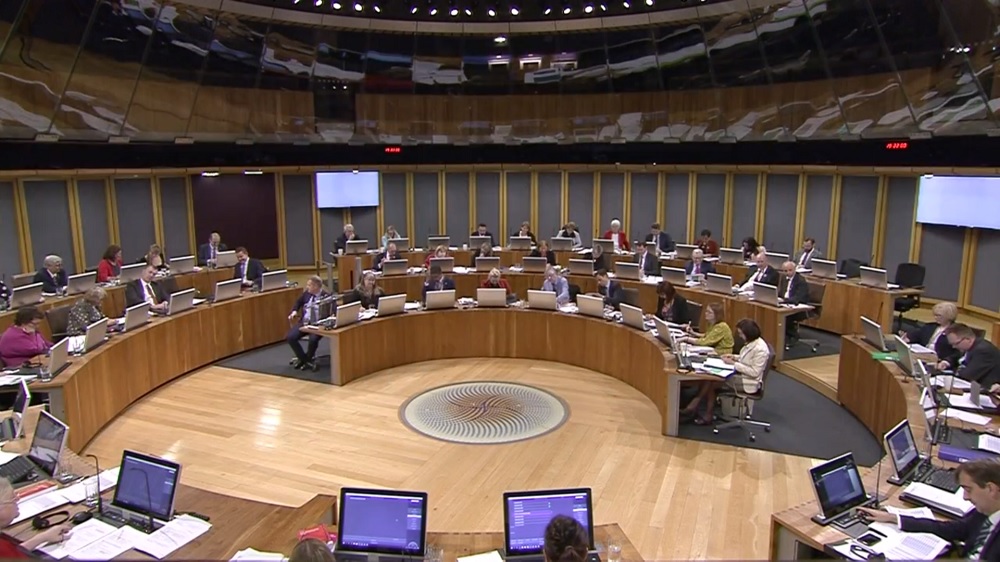Job sharing ‘key tool’ for increasing diversity in Welsh politics argues gender equality group

Allowing politicians to share their jobs with other candidates would be a key tool in increasing diversity in Welsh politics, a group campaigning for gender equality has argued.
Welsh Labour and Plaid Cymru leaders Mark Drakeford and Adam Price recommended earlier this month that Senedd elections should move towards gender quotas.
But the Women’s Equality Network Wales has argued in a new report that this would not be a “silver bullet” to solve problems of diversity in Welsh politics, and argued that job sharing was required in addition.
For constituents, job-sharing could deliver “two for the price of one” in terms of skills and experience and could enable members to retain better connections to their life outside the Senedd which can be relevant to scrutiny and representative work, they said.
According to academic experts Rosie Campbell and Sarah Childs, job-sharing candidates should stand as a joint candidate with priorities, goals and working arrangements agreed prior to selection. They should be elected jointly through a single, shared vote to retain job sharers as a “single legal entity” as one joint candidate on the election paper.
Bethan Sayed, researcher and a former Plaid Cymru Member of the Senedd, said that job sharing should be part of the discussion in creating a Senedd that was “truly forward-thinking, flexible and fit for the 21st Century”.
“This is a discussion about getting new people into politics, with new ideas. It’s about how we work in a different way by sharing responsibilities and tasks,” she said.
“It’s about breaking down barriers to those who wouldn’t dream of entering politics otherwise. It’s about making the Senedd the true voice of the people of Wales.”
Control over the arrangements for both council and Senedd elections are devolved to Wales.
‘Big impact’
The research found that support for job sharing in politics jumpe by 11% to 48% “once those polled understood the key benefits”.
This suggested that any future legislation on job-sharing in the Senedd can gather wide public support if the rationale and benefits of such a proposal are communicated clearly and transparently, WEN said.
New ideas for future electoral processes are currently being considered as part of Stage 2 of the Senedd reform process. WEN Wales recommended:
• The Special Purpose Committee on Senedd Reform should make a policy recommendation to the Welsh Government for a change in legislation that permits job-sharing candidates in the next Senedd election, which could be explored as the reform bill is being prepared.
• Encourage executive job-sharing in local government to be used by a wide range of elected members, not only women.
Dr Jessica Laimann, Policy & Public Affairs Officer at WEN Wales said: “The increase in women’s representation by 8% following the local elections marks an important step forward.
“But we still have a long way to go and urgently need to explore all avenues to increase diversity in Welsh politics. Job-sharing has already been successfully used in some council cabinets and using it more widely across all levels of government in Wales could have a big impact.
“This research clearly shows that job-sharing can be an important lever to help achieve political representation that reflects our diverse population, and thus strengthen our democracy.”
Support our Nation today
For the price of a cup of coffee a month you can help us create an independent, not-for-profit, national news service for the people of Wales, by the people of Wales.






Maybe the issue is the view of ‘politician’ being a job, or having a ‘political career’. Don’t know how it would be done, but perhaps a cultural shift to consider the role as a civic responsibility? The idea of “two for the price of one” may work for packs of sausages at Co-op, but I’m not sure I’d want 2 politicians for my one vote – it’s going to cement party ideology/scrap principled positions being allowable, thus homogenising political thought.
I’m a big supporter of job sharing for most jobs. But, I’m really unsure about it for elected politicians. My main concern is a simple one of accountability. It is simply not possible to elect two people whose views on everything are in complete accord. Inevitably, therefore, most people will have a preference for one of the two job-sharers. That’s not an insurmountable problem in itself. It is a problem where their views on key or controversial matters or their abilities and aptitudes are very different. Who do you hold to account for the view or action you dislike? If… Read more »